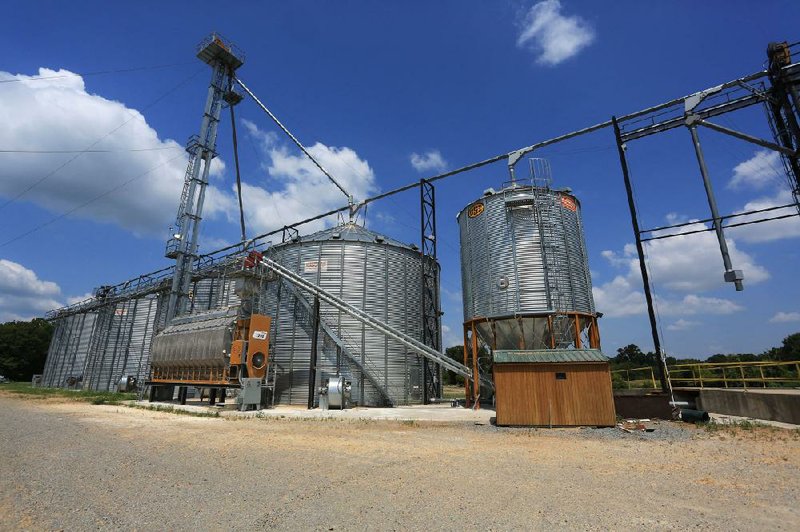LONOKE -- A Lonoke County jury on Wednesday awarded $6 million in punitive damages to a group of farmers embroiled in the 2014 collapse of Turner Grain Merchandising Inc., essentially matching its verdict Tuesday on how much money the farmers lost.
Most of the $5.9 million in compensatory damages was placed on the estate of Jason Coleman, a Turner Grain co-founder who died early last year, and on several Turner Grain entities that were never registered with the secretary of state's office to do business in Arkansas.
The jury assigned 46% of the compensatory damages to the Coleman estate and 46% to the Turner entities.
On Wednesday, after about four hours of deliberations, the jury reached its verdict on punitive damages and, again, placed most of the liability on the Coleman estate and the Turner entities.
The jury had directed compensatory damages at $2.3 million to be paid to Zero Grade Farms; $691,478 for Gary Hardke Farms; $1.6 million for K&K Farm Service Inc. and $1.3 million for Edward Schafer & Sons Farms.
The jury set punitive damages at those same amounts for each farm, divided equally between the Coleman estate and the Turner groups. It then added $30,000 in damages to each entity against Steven Keith, co-founder and president of KBX Inc., a Little Rock grain exporter.
There is no evidence that either the Coleman estate or the Turner entities have any assets. Turner Grain Merchandising Inc., the main corporation of Coleman and fellow co-founder Dale Bartlett, is mired in U.S. Bankruptcy Court.
Turner Grain was forced to close its doors in August 2014 when federal regulators found no grain in bins certified as being full. It filed for federal bankruptcy protection about two months later, ultimately listing about $14 million in assets and $47 million in debts, mostly to farmers.
Scott Poynter, a Little Rock attorney for KBX, declined to comment Wednesday except to praise the jury for its work during the 17-day trial and to say an appeal is likely.
Kendel Grooms, an attorney for the farmers, also declined comment.
While Wednesday's verdict concluded the Lonoke County trial, three other lawsuits against the same defendants are pending in Lawrence, Poinsett and Lee counties.
KBX also has a lawsuit pending in Lonoke County Circuit Court against the Lonoke County farmers who won the verdicts this week and against Turner Grain entities.
KBX has contended throughout the nearly six years that Turner Grain has been closed that it paid the Brinkley dealer for all the grain KBX purchased from it, including some $28 million in Turner's final weeks of operations.
KBX and other defendants in the trial that concluded Wednesday agreed that the Lonoke County farmers were never paid for their grain.
The farmers contended that KBX was the ultimate buyer of their combined 832,703 bushels of rice.
The farmers' attorneys throughout the trial in Lonoke County accused KBX of deceit and conspiracy, largely through its failure to turn over certain documents and evidence during the pre-trial discovery phase.
Circuit Judge Sandy Huckabee twice in recent years found that records of phone calls, text messages and emails were deleted or destroyed and cited KBX for those violations. Huckabee allowed the jury to consider those violations as it weighed the case over the past four weeks.
Founded in 20o2 and housed initially in the home of one of its co-founders, Turner Grain grew from a grain marketer to also have a trucking brokerage firm to haul grain, a rice storage operation and other businesses.
According to bankruptcy records, Turner Grain Merchandising Inc. reported sales of $223.8 million in 2012, $277.9 million in 2013, and $235.3 million in 2014 until the time of its closing.
A certified public account testified last week that Turner was grossly undercapitalized and lacked the accounting software necessary for such a large operation.
In Turner's final weeks, she said, employees made frequent telephone calls to its banks in Helena and Clarendon to determine the balances in Turner accounts.
Turner's contracts with the farmers ranged from $7.04 per bushel to $7.29 per bushel, considerably higher than other prices in the market at the time, according to testimony. The per-bushel differences paid by KBX to Turner for that rice ranged from 33 cents to 99 cents less, putting Turner "upside down" on those contracts, according to testimony.
Business on 02/27/2020
